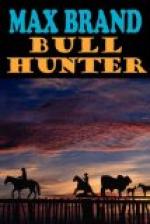Every day on that south trail was like a year in the life of Bull. Heat and thirst wasted him, the constant labor of the march hardened his muscles, and he got that forward look about his eyes, which comes with shadows under the lids and a constant frown on the forehead. It was long afterward that men checked up his march from date to date and discovered that the distance between the shack of Bill Campbell and Halstead in the South was one hundred and fifty miles over bitter mountains and burning desert, and that Bull Hunter had made the distance in five days.
All this was learned and verified later when Bull was a legend. When he strode into Halstead on that late afternoon no one had ever heard of the man out of the mountains. He was simply an oddity in a country where oddities draw small attention.
Yet a rumor advanced before Bull. A child, playing in the incredible heat of the sun, saw the dusty giant heaving in the distance and ran to its mother, frightened, and the worn-faced mother came to the porch and shaded her eyes to look. She passed on the word with a call that traveled from house to house. So that, when Bull entered the long, irregular street of Halstead, he found it lined on either side by children, old men, women. It was almost as though they had heard of the thing he had come to do and were there to watch.
Bull shrank from their eyes. He would far rather have slipped around the back of the village and gone toward its center unobserved. A pair of staring eyes to Bull was like the pointing of a loaded gun. He put unspoken sentences upon every tongue, and the sentences were those he had heard so often from his uncle and his uncle’s sons.
“Too big to be any good.”
“Bull’s got the size of a hoss, and as a hoss he’d do pretty well, but he ain’t no account as a man.”
His life had been paved with such burning remarks as these. Many an evening had been long agony to him as the three sat about and baited him. He hurried down the street, the pulverized sand squirting up about his heavy boots and drifting in a mist behind him. When he was gone an old man came out and measured those great strides with his eye and then stretched his legs vainly to cover the same marks. But this, of course, Bull did not see, and he would not have understood it, had he seen, except as a mockery.
He paused in front of the hotel veranda, an awful figure to behold. His canvas coat was rolled and tied behind his sweating shoulders; his too-short sleeves had bothered him and they were now cut off at the elbow and exposed the sun-blackened forearms; his overalls streamed in rags over his scarred boots. He pushed the battered hat far back on his head and looked at the silent, attentive line of idlers who sat on the veranda.
“Excuse me, gents,” he said mildly. “But maybe one of you might know of a little gent with iron-gray hair and a thin face and quick ways of acting and little, thin hands.” He illustrated his meaning by extending his own huge paws. “His name is Pete Reeve.”




